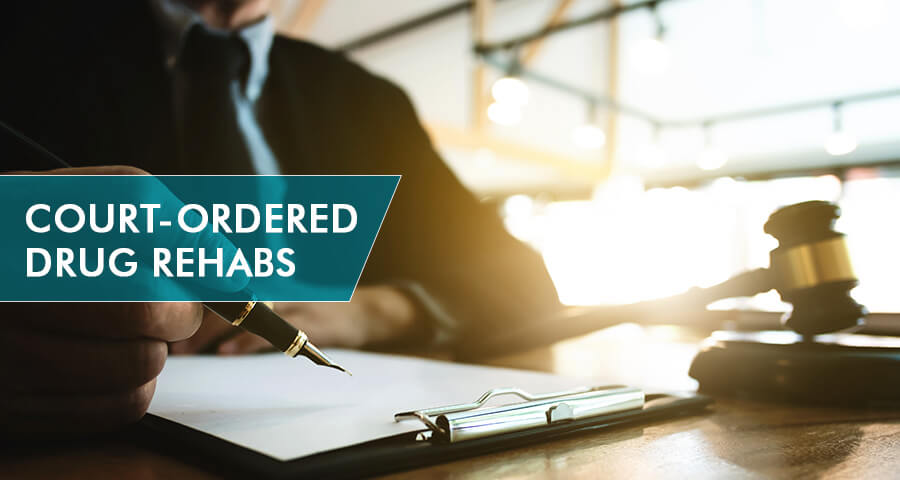
Substance abuse and addiction are often accompanied by unhealthy behaviors, social misconduct, and compulsion to commit a crime. In many young adults, cases of misdemeanors are rampant, while accidents caused by DUIs are on the rise.
Table Of Contents:
- What is Court Ordered Rehab?
- What is An Emergency Court-Ordered Drug Rehab?
- How Do You Get Court Ordered Rehab – Qualifying?
- How Do You Get Someone A Court Ordered Rehab Under The Marchman Act?
- What are Drug Courts?
- What are Drug Intervention Programs?
- Who Pays For A Court Ordered Drug/Alcohol Treatment?
- What Is the Effectiveness Of A Court Mandated Rehab
- What are The Benefits Of Court-Ordered Rehabs?
- How Long Is Court Ordered Rehab?
- What Happens When Failing To Complete Court Mandated Rehab?
- Court Ordered Rehab: A Necessary Step

The effect of addiction is not only felt by the user but also by friends and family. In cases where the user poses a threat to themselves or the people around them, it is best to consider a court-ordered rehab. Court-ordered treatment for substance abuse imposes therapy on individuals who do not have any plans to seek help. This course of action is usually instigated by a friend, family, or loved one who desires a positive change.
This article is focused on how to get someone court-ordered rehab, who can benefit from court-ordered rehabs, and how they work.
What Is Court-Ordered Rehab?
As the name implies, court-ordered rehab is a mandatory rehabilitation from a drug or alcohol addiction as ordered by a judge as part of a court ruling. It is usually instead of a prison term which is a punishment that might not have matched the nature of the crime. It’s a common occurrence for law-breakers under the influence of a substance, whether it was illicit or legal when they committed a crime, to be ordered to participate in a compulsory rehabilitation program.
Such people are addicted to alcohol or other drugs, impairing their judgment and leading them to commit a relatively minor crime. However, at other times, it’s the driving force behind a crime as an offender may steal or partake in some illegal activity just to acquire some money to feed the addiction.
People who are ordered to go through court-ordered drug treatment are mostly just regular people who need care. If the crime committed is not violent, the judge has an option of ordering a court-mandated drug program for recovery instead of prosecution or incarceration. There are also court-ordered substance abuse classes online to help with education, therapy, and counseling.
The main aim as far as the law is concerned is the complete rehabilitation of the offender and to ensure that the rehabilitated individual does not graduate into even more serious crimes. So a desire for success is very strong.
It makes sense to achieve this end with the littlest amount of stress possible, both to the government and the defendant. This is why it is sensible to look before leaping to just any court-appointed rehab center available. However, there is more to it than meets the eye, as all rehab centers are not equal or equally suited to everyone in terms of care and therapy for recovery.
A court-ordered rehab has been used for years as a lighter punishment for crimes and misdemeanors tied to drug abuse; it is often an option to much weightier legal actions, giving the individual the option to turn from drug abuse or face the full extent of the law.
Emergency Court-Ordered Drug Rehab
An emergency court order requires a screening investigation in which both police officers and addiction professionals take part. The person is taken into custody to determine if they qualify for an emergency order. Suppose they are found unable to control their actions (use drugs every day or suffer from health problems caused by drug abuse) and behave in ways that threaten the health and safety of those around them. In that case, an emergency decree such as the court-ordered treatment program act 122 becomes a distinct possibility. A court hearing will be scheduled, at which the addict’s family plead their case. After that, the authorities have the last word.

How to Get Court-Ordered Rehab – Qualifying
Court-ordered rehab is a form of mandatory rehab for drug or alcohol addiction as part of a court ruling. Courts recognize that a prison sentence might not always be the best recovery option. Addiction can impair judgment and lead one to commit a relatively minor crime. It can be the driving force behind a crime as an offender may steal or commit another illegal act to get money for drugs. If the crime committed is not violent, the judge has an option of ordering a court-mandated drug program instead of prosecution or incarceration.
The main aim is the full rehabilitation of the offender to prevent him or her from committing a more serious crime down the line. Court-ordered rehab is a way to achieve this with the least effort and stress possible, both to the government and the defendant.
The Court May Order Rehab Instead of Jail Time if the Following Criteria are Met:
- The crime was nonviolent
- The crime committed was a direct or indirect result of dependence on drugs
- The court believes the person would benefit from drug or alcohol rehab
- The person qualifies for a probation sentence
How to Get Someone Court-Ordered Rehab Under the Marchman Act
The Marchman Act makes provision for a drug addict to get professional help through intervention and court-ordered rehab. Marchman’s laws are one of the most advanced state laws applied in dealing with non-voluntary addiction treatment. The Florida law, enacted in the 1970s, was put in place to assist families in getting compulsory medical help for addiction through court intervention, especially when the drug addict refuses to seek professional help.
The law allows families and close friends to appeal for involuntary or court-mandated rehab. Secondly, the appeal may be valid if the drug addict is likely to bring harm to himself and others also if he or she is so unreasonable as not to see the need to seek professional help. This legal intervention is one of the best methods of mediation, especially for those who have completely lost self-control and are highly-dependent on the substance.
Who is Eligible for Treatment Instead of Incarceration?
To be eligible to receive court-ordered rehabilitation, a person would need to meet some requirements. If all of them are met, then the offender should be able to apply for drug treatment instead of going to jail for a minor crime.
The conditions for qualifying for the treatment under the Marchman Act are the same as mentioned above.

Drug Courts Overview
Drug courts are an alternative to conventional criminal courts that are designed to prevent law offenders suffering from addiction from going to prison. These offenders are admitted to addiction treatment programs instead. Since the goal of sentences is primarily rehabilitation and not just punishment, people with substance use disorder will more likely benefit from an addiction treatment program more than a prison term.
Participation in a drug court is not mandatory, but to be eligible, the defendant must have pleaded guilty to the crime he/she has been charged with and be willing to go through the court-mandated drug treatment.
The offender, once checked into rehab, is expected to abide by some or all of the following terms:
- A sentence of 12 to 24 months
- Complete abstinence from the addictive substance
- Regular updates with the court-appointed officials
- Random drug or alcohol tests
- Compulsory participation in court-ordered substance abuse treatments
- Community service
Drug Intervention Programs
Several work programs have been put in place to assist people addicted to alcohol and drugs to beat the addiction while avoiding all or part of a jail sentence. Depending on the type of crime committed, a specific drug intervention program will be selected for the defendant.
- Accelerated Pretrial Rehabilitation Program: The program has strict requirements in order for the defendant to qualify for it, such as not having participated in a similar program before or having committed a felony, etc. Once the defendant is deemed to have qualified for the program, he/she is released to the Court Support Services Department (CSSD), who is in charge of overseeing the rehabilitation program. The defendant is acquitted of all charges once he/she has successfully completed the program.
- Alcohol Education Program: People who have been charged with driving or operating a motor vehicle under the influence of alcohol may be eligible for this program. The court file is sealed if the defendant applies for this program. During the CSSD’s investigation into whether or not a defendant is eligible for this program, the Department of Mental Health and Addiction Services (DMHAS) evaluation is also carried out. This evaluation is used to decide if and what type of program the defendant should be in. The options include a 10-week educational program, a 15-week educational program, or a treatment program. Once the defendant successfully completes the program, all charges are dropped by the court.
- Drug Education and Community Service Program: This program is applicable to people who have been charged with possession of drugs or drug-related paraphernalia. Some conditions may limit a person’s eligibility to this program, such as having twice participated in it or participation in a similar program before. Investigations into a defendant’s eligibility are similar to that of the Alcohol Education Program, and the DMHAS gets involved as well. Their findings and possible previous involvement in the program by the defendant may lead to the defendant being recommended for either a 15-week educational work program or a 15-week long substance abuse treatment program. Like other work programs, if the defendant successfully completes the program assigned, the charges are dismissed.
Read more about drug intervention programs here.

Who Pays For A Court Ordered Drug or Alcohol Treatment?
The court is never required to pay for a person’s addiction treatment. In most cases, the defendant must pay the rehab center. The defendant also has the right to choose the treatment center, allowing them to consider a number of factors when deciding where to go for treatment, including cost. This flexibility means the defendant should choose according to specific criteria that will ensure the treatment does not become tiring and tedious. Cost of treatments vary widely, among other factors. If treatment is not affordable, some centers offer sliding payment services or allow clients to pay over a longer period of time. In states where “Casey’s Law” is effective, anyone who petitions for court-mandated rehab must find a way to pay for it. They have to sign a legally binding agreement on the terms of payment. Private drug treatment programs can cost thousands of dollars, but there are many free rehabilitation centers across the U.S.
Do I Have to Pay for Rehab if It is Court-Ordered?
Yes, in most cases, the defendant must pay for rehab even if it is court-ordered. The defendant also has the right to choose the treatment center, allowing him or her to consider a number of factors, including cost, when deciding where to go for treatment.
When an offender is placed in drug or alcohol treatment, it does not negate a sentence until the treatment has been completed successfully.
Insurance Coverage
Health insurance could help cover rehabilitation. After the Mental Health Parity and Addiction Equity Act was passed in 2008, insurance companies cannot enforce harsh benefit limitations on people suffering from addiction or mental health disorders. Unfortunately, this law focuses mainly on large group health plans, such as those employers provide. It does cover individual policies, but it can be more difficult to find ones that fully cover rehabilitation. If court-ordered rehab is anticipated, it may be a good idea to call the insurance company and discuss coverage options. The company should make an effort to find a plan that at least partially covers treatment.
Sliding Fee Centers
The Bureau of Drug and Alcohol Services offers a number of non-profit centers aimed at helping people struggling to finance their treatment. Inpatient and outpatient services are provided based on a sliding fee. This fee is calculated according to personal income and savings, meaning the patient won’t pay more than they and/or their families can afford. If the patient has no income, they may not have to pay for treatment at all. As these centers are set up for court-ordered rehab and other forms of crisis intervention, the likelihood of getting access to them is high. Judges are inclined to send defendants to sliding fee centers because these offer relatively comprehensive rehab programs.
Effectiveness of Court Mandated Rehab
Families that have an addicted member are often concerned about whether court-ordered rehab will prove effective. It would seem the success rate wouldn’t be very high as people are practically being forced into treatment. However, the effectiveness of court-mandated treatment hinges entirely on intrinsic motivation – that is, the motivation of the person in rehab, not external factors.
How effective is a court-ordered rehab for positive treatment outcomes? According to reports, court-mandated rehab treatment promotes a high attendance rate and for longer periods due to the legal pressure and steep consequences and conditions enforced by the law.
Another test showed that individuals who were enrolled in court-mandated rehab and received addiction care were far less motivated to comply but were ten times more likely to complete their treatment than those who came into rehab on their own volition.
Data of the NIDA and Department of Veterans Affairs Health Services Research and Development Service show that mandatory rehab is just as effective as voluntary rehab. A group of men who underwent court-appointed treatment for alcohol and drug problems reported lower levels of motivation at the beginning of rehab. However, their rates of employment, re-arrest, and abstinence five years later were the same as those of peers who had undergone voluntary rehab.
Results of shorter-term studies have shown similar outcomes. A study by the National Criminal Justice Reference Service on coerced treatment effectiveness stated that the person in treatment ultimately “decides upon the outcome” even though court-appointed rehab and other coercive methods of treatment were often shown to be effective approaches to motivate a person to change for the better. Basically, if a person feels no need or doesn’t want to change, they aren’t likely to do so.

Benefits Of Court-Ordered Rehabs
Court-ordered treatment for substance abuse may seem forced, but it has immense benefits in the patient’s life and family.
Active participation in the center is favorable in the following ways:
- Patients pick up life skills, develop coping mechanisms, and learn to manage stress and cravings. These lessons are incorporated into the treatment program.
- A court-ordered rehab whisks drug addicts away to a serene environment that cuts off all the noise, enabling healing in a private space.
- Extensive care at your fingertips—inclusive of detox, family therapy, holistic healing methods, and others
- The patient gets to observe the changes and positive outcomes, seeing how far they have come and receiving support from groups and individuals for the road ahead
How Long is Court Ordered Rehab?
People often ask, how long is court-ordered rehab? The duration may vary due to the different recovery rates in different individuals; however, it is never longer than 60 days. Court-ordered treatment for substance abuse may decide, after a case hearing, to extend the rehab program until experts testify to improvements. After detox, individuals with significant improvements may choose to stay longer to receive support or opt for aftercare solutions; this, of course, is based on a professional assessment of in-house medical practitioners.
Failing to Complete Court-Mandated Rehab
All individuals put into a court-ordered treatment program on drug-related criminal charges, including charges their families have made against them, must complete their treatment as part of their punishment. If they fail to do so, they face prosecution for their crime to the fullest legally permissible extent (in deferred prosecution programs). They may plead guilty, but they will face the conviction and fine that come with the plea. Depending on the judge, the sentence pronounced may be harsher if someone has failed a treatment program. If the person pleaded guilty before the court-ordered rehab, they are taken back to court to face sentencing based on their earlier plea (post-adjudication program). They will likely face a minimum of the sentence previously served, although this is subject to adjustment by the judge as they failed to complete treatment. They can change their plea to “not guilty” if they choose, but their case probably won’t be successful given the circumstances.
If the program is completed, on the other hand, charges are dropped. This model typically applies when the person doesn’t have a criminal record or has had very few legal troubles. Also, the crime will not show up on their record. If the person has pleaded guilty to the crime and received a sentence and a fine, they will be dropped upon completing the program. This method applies when the person has a prior record.
Court-Ordered Rehab: A Necessary Step
Whether it is court-ordered substance abuse classes online or a physical rehab, court-ordered treatment is frequently an effective way to shock a loved one into realizing what problems their abuse has caused. In this situation, most people will get serious about treatment. This may not guarantee a successful outcome, but there is no fail-safe approach to addiction treatment. Only the commitment and willpower of the person in recovery can ensure positive results. Court-ordered rehab forces them into circumstances in which they have to consider becoming and staying sober. This is often a crucial first step, as they come to see the possibility of leading a full, satisfying life free of drugs and legal troubles.a
Hope Without Commitment
Find the best treatment options. Call our free and confidential helpline
Most private insurances accepted
Find Drug Rehabilitation Centers Near You Anywhere In the US
Addiction Resource team has compiled an extensive list of the top drug rehabilitation facilities around the country. Use our locator tool to find the best centers near you.
Page Sources
- Superior Court Criminal Division, A Guide to Special Sessions & Diversionary Programs in Connecticut, https://www.jud.ct.gov/Publications/CR137P.pdf
- NIDA. (2006, July 1). Court-Mandated Treatment Works as Well as Voluntary. Retrieved from https://archives.drugabuse.gov/news-events/nida-notes/2006/07/court-mandated-treatment-works-well-voluntary
- Naegle, M. A., Richardson, H., & Morton, K. (2004). Rehab Instead of Prison: Drug courts provide opportunities for nurse practitioners. AJN The American Journal of Nursing, 104(6), 58-61. https://journals.lww.com/ajnonline/Citation/2004/06000/Rehab_Instead_of_Prison__Drug_courts_provide.34.aspx
- NIDA. 2020, June 3. Is legally mandated treatment effective? Retrieved from https://www.drugabuse.gov/publications/principles-drug-abuse-treatment-criminal-justice-populations-research-based-guide/legally-mandated-treatment-effective https://www.drugabuse.gov/publications/principles-drug-abuse-treatment-criminal-justice-populations-research-based-guide/legally-mandated-treatment-effective
- Coviello, D. M., Zanis, D. A., Wesnoski, S. A., Palman, N., Gur, A., Lynch, K. G., & McKay, J. R. (2013). Does mandating offenders to treatment improve completion rates?. Journal of substance abuse treatment, 44(4), 417–425. https://doi.org/10.1016/j.jsat.2012.10.003
- Coviello, D. M., Zanis, D. A., Wesnoski, S. A., Palman, N., Gur, A., Lynch, K. G., & McKay, J. R. (2013). Does mandating offenders to treatment improve completion rates?. Journal of Substance Abuse Treatment, 44(4), 417-425.https://www.ncbi.nlm.nih.gov/pmc/articles/PMC3578041/
- U.S. Department of Justice, Office of Justice Programs, National Institute of Justice, The Rebirth of Rehabilitation: Promise and Perils of Drug Court, May 2000, https://www.ojp.gov/pdffiles1/nij/181412.pdf
- James Orlando, OLR Research Report, Florida Law On Substance Abuse Treatment, December 20, 2012, https://www.cga.ct.gov/2012/rpt/2012-r-0536.htm
- The Florida Senate, BILL ANALYSIS AND FISCAL IMPACT STATEMENT, https://www.flsenate.gov/Session/Bill/2021/828/Analyses/2021s00828.cf.PDF


 Reviewed by:
Reviewed by:  Written by:
Written by: 











 FindTreatment.gov
FindTreatment.gov